Analysis of MNCs Internationalization and Market Entry Strategies
VerifiedAdded on 2022/12/27
|16
|5669
|1
Report
AI Summary
This report provides a comprehensive analysis of multinational corporations (MNCs) and their internationalization strategies. It begins with an introduction to global businesses and their significance in economic growth, followed by a discussion on why MNCs internationalize and the challenges they typically face, such as understanding the external environment and predicting future prospects. The report then selects Unilever as a case study, examining how the company could enter an international market, specifically Australia, where it does not currently have a significant presence. The report proposes franchising as a suitable market entry strategy for Unilever, detailing its implementation and advantages. It also identifies potential challenges associated with franchising, such as conflicts with franchisees and strict regulations. Furthermore, the report delves into the environmental analysis necessary for successful internationalization, including socio-cultural, economic, legal, political, and technological factors. The report concludes with a reflection on the key takeaways and implications of MNC internationalization.
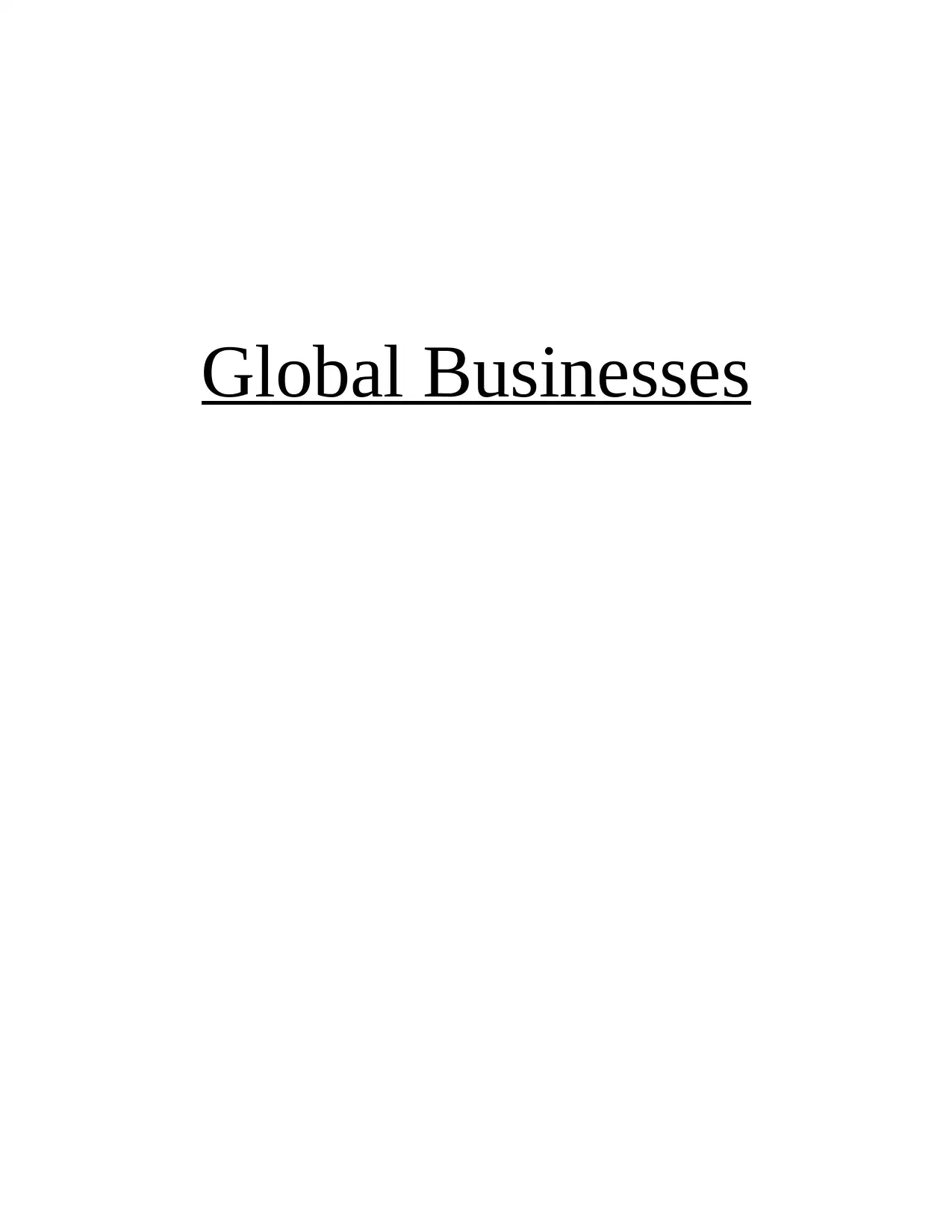
Global Businesses
Paraphrase This Document
Need a fresh take? Get an instant paraphrase of this document with our AI Paraphraser
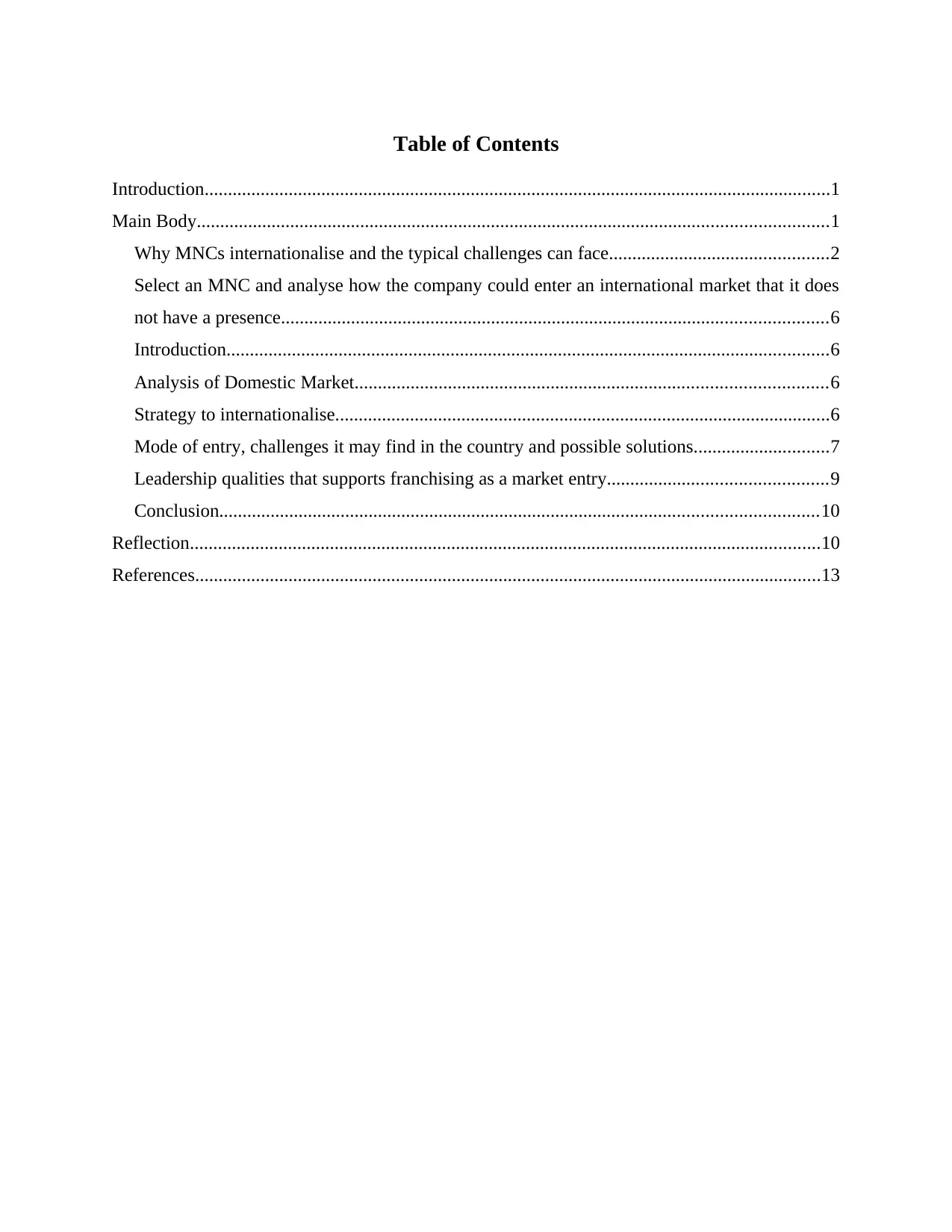
Table of Contents
Introduction......................................................................................................................................1
Main Body.......................................................................................................................................1
Why MNCs internationalise and the typical challenges can face...............................................2
Select an MNC and analyse how the company could enter an international market that it does
not have a presence.....................................................................................................................6
Introduction.................................................................................................................................6
Analysis of Domestic Market.....................................................................................................6
Strategy to internationalise..........................................................................................................6
Mode of entry, challenges it may find in the country and possible solutions.............................7
Leadership qualities that supports franchising as a market entry...............................................9
Conclusion................................................................................................................................10
Reflection.......................................................................................................................................10
References......................................................................................................................................13
Introduction......................................................................................................................................1
Main Body.......................................................................................................................................1
Why MNCs internationalise and the typical challenges can face...............................................2
Select an MNC and analyse how the company could enter an international market that it does
not have a presence.....................................................................................................................6
Introduction.................................................................................................................................6
Analysis of Domestic Market.....................................................................................................6
Strategy to internationalise..........................................................................................................6
Mode of entry, challenges it may find in the country and possible solutions.............................7
Leadership qualities that supports franchising as a market entry...............................................9
Conclusion................................................................................................................................10
Reflection.......................................................................................................................................10
References......................................................................................................................................13
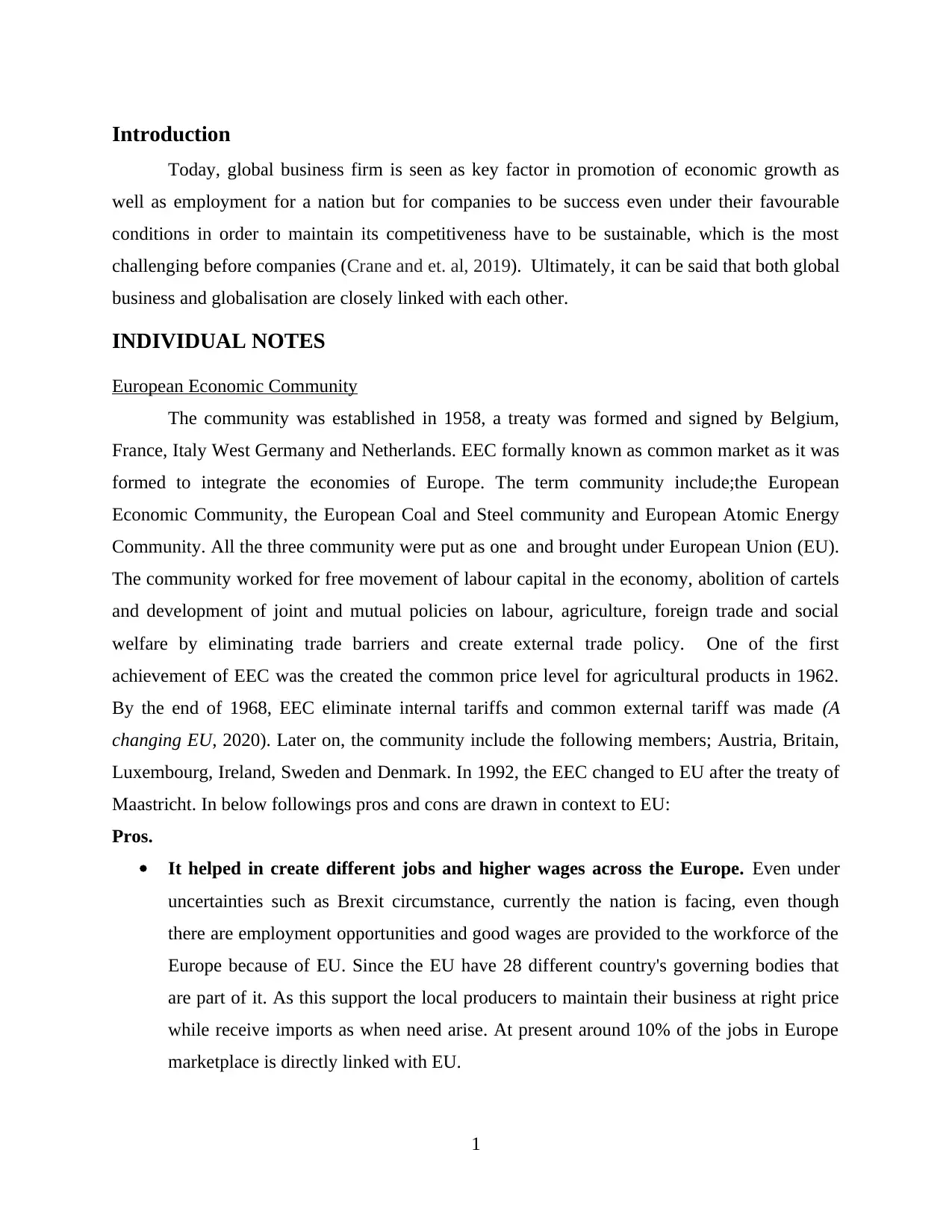
Introduction
Today, global business firm is seen as key factor in promotion of economic growth as
well as employment for a nation but for companies to be success even under their favourable
conditions in order to maintain its competitiveness have to be sustainable, which is the most
challenging before companies (Crane and et. al, 2019). Ultimately, it can be said that both global
business and globalisation are closely linked with each other.
INDIVIDUAL NOTES
European Economic Community
The community was established in 1958, a treaty was formed and signed by Belgium,
France, Italy West Germany and Netherlands. EEC formally known as common market as it was
formed to integrate the economies of Europe. The term community include;the European
Economic Community, the European Coal and Steel community and European Atomic Energy
Community. All the three community were put as one and brought under European Union (EU).
The community worked for free movement of labour capital in the economy, abolition of cartels
and development of joint and mutual policies on labour, agriculture, foreign trade and social
welfare by eliminating trade barriers and create external trade policy. One of the first
achievement of EEC was the created the common price level for agricultural products in 1962.
By the end of 1968, EEC eliminate internal tariffs and common external tariff was made (A
changing EU, 2020). Later on, the community include the following members; Austria, Britain,
Luxembourg, Ireland, Sweden and Denmark. In 1992, the EEC changed to EU after the treaty of
Maastricht. In below followings pros and cons are drawn in context to EU:
Pros.
It helped in create different jobs and higher wages across the Europe. Even under
uncertainties such as Brexit circumstance, currently the nation is facing, even though
there are employment opportunities and good wages are provided to the workforce of the
Europe because of EU. Since the EU have 28 different country's governing bodies that
are part of it. As this support the local producers to maintain their business at right price
while receive imports as when need arise. At present around 10% of the jobs in Europe
marketplace is directly linked with EU.
1
Today, global business firm is seen as key factor in promotion of economic growth as
well as employment for a nation but for companies to be success even under their favourable
conditions in order to maintain its competitiveness have to be sustainable, which is the most
challenging before companies (Crane and et. al, 2019). Ultimately, it can be said that both global
business and globalisation are closely linked with each other.
INDIVIDUAL NOTES
European Economic Community
The community was established in 1958, a treaty was formed and signed by Belgium,
France, Italy West Germany and Netherlands. EEC formally known as common market as it was
formed to integrate the economies of Europe. The term community include;the European
Economic Community, the European Coal and Steel community and European Atomic Energy
Community. All the three community were put as one and brought under European Union (EU).
The community worked for free movement of labour capital in the economy, abolition of cartels
and development of joint and mutual policies on labour, agriculture, foreign trade and social
welfare by eliminating trade barriers and create external trade policy. One of the first
achievement of EEC was the created the common price level for agricultural products in 1962.
By the end of 1968, EEC eliminate internal tariffs and common external tariff was made (A
changing EU, 2020). Later on, the community include the following members; Austria, Britain,
Luxembourg, Ireland, Sweden and Denmark. In 1992, the EEC changed to EU after the treaty of
Maastricht. In below followings pros and cons are drawn in context to EU:
Pros.
It helped in create different jobs and higher wages across the Europe. Even under
uncertainties such as Brexit circumstance, currently the nation is facing, even though
there are employment opportunities and good wages are provided to the workforce of the
Europe because of EU. Since the EU have 28 different country's governing bodies that
are part of it. As this support the local producers to maintain their business at right price
while receive imports as when need arise. At present around 10% of the jobs in Europe
marketplace is directly linked with EU.
1
⊘ This is a preview!⊘
Do you want full access?
Subscribe today to unlock all pages.

Trusted by 1+ million students worldwide
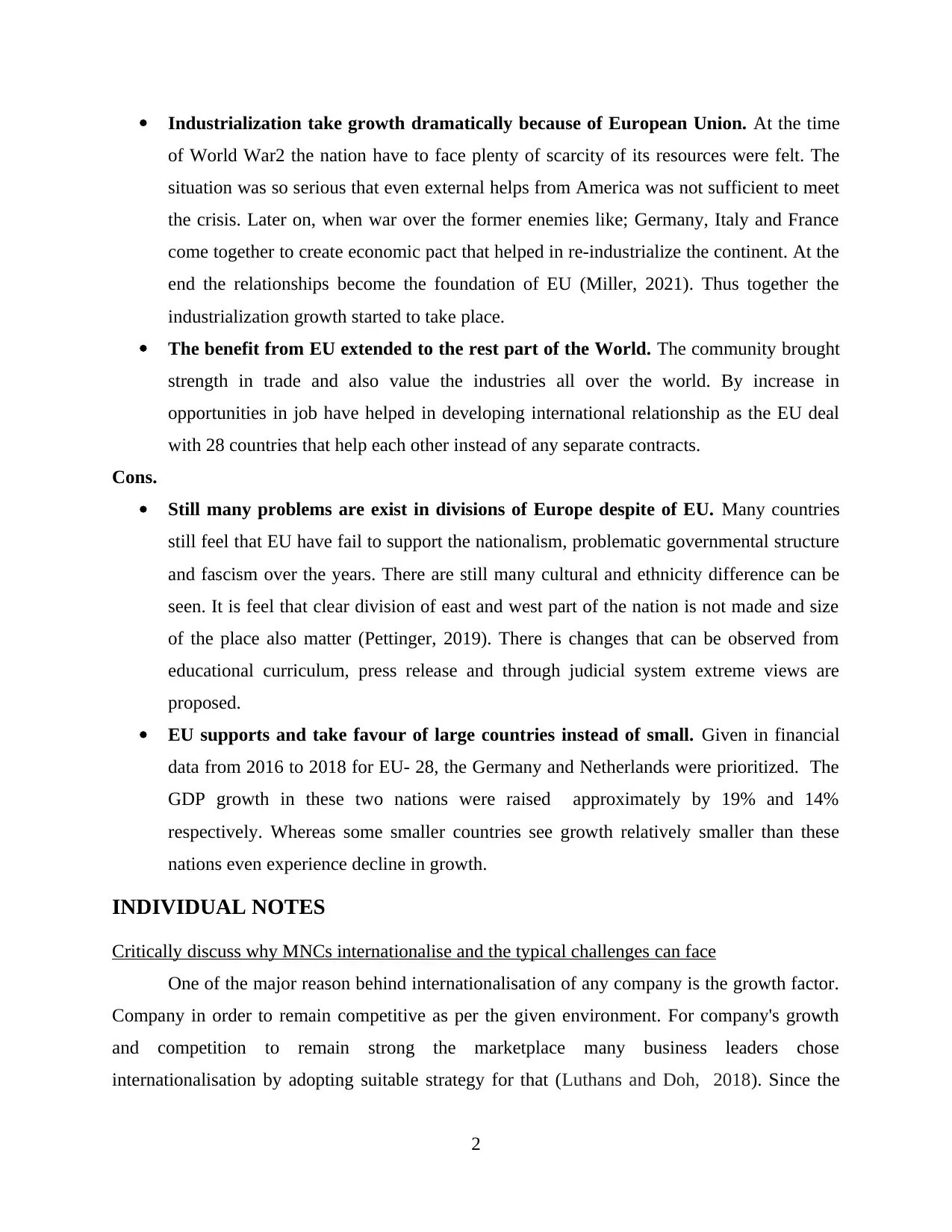
Industrialization take growth dramatically because of European Union. At the time
of World War2 the nation have to face plenty of scarcity of its resources were felt. The
situation was so serious that even external helps from America was not sufficient to meet
the crisis. Later on, when war over the former enemies like; Germany, Italy and France
come together to create economic pact that helped in re-industrialize the continent. At the
end the relationships become the foundation of EU (Miller, 2021). Thus together the
industrialization growth started to take place.
The benefit from EU extended to the rest part of the World. The community brought
strength in trade and also value the industries all over the world. By increase in
opportunities in job have helped in developing international relationship as the EU deal
with 28 countries that help each other instead of any separate contracts.
Cons.
Still many problems are exist in divisions of Europe despite of EU. Many countries
still feel that EU have fail to support the nationalism, problematic governmental structure
and fascism over the years. There are still many cultural and ethnicity difference can be
seen. It is feel that clear division of east and west part of the nation is not made and size
of the place also matter (Pettinger, 2019). There is changes that can be observed from
educational curriculum, press release and through judicial system extreme views are
proposed.
EU supports and take favour of large countries instead of small. Given in financial
data from 2016 to 2018 for EU- 28, the Germany and Netherlands were prioritized. The
GDP growth in these two nations were raised approximately by 19% and 14%
respectively. Whereas some smaller countries see growth relatively smaller than these
nations even experience decline in growth.
INDIVIDUAL NOTES
Critically discuss why MNCs internationalise and the typical challenges can face
One of the major reason behind internationalisation of any company is the growth factor.
Company in order to remain competitive as per the given environment. For company's growth
and competition to remain strong the marketplace many business leaders chose
internationalisation by adopting suitable strategy for that (Luthans and Doh, 2018). Since the
2
of World War2 the nation have to face plenty of scarcity of its resources were felt. The
situation was so serious that even external helps from America was not sufficient to meet
the crisis. Later on, when war over the former enemies like; Germany, Italy and France
come together to create economic pact that helped in re-industrialize the continent. At the
end the relationships become the foundation of EU (Miller, 2021). Thus together the
industrialization growth started to take place.
The benefit from EU extended to the rest part of the World. The community brought
strength in trade and also value the industries all over the world. By increase in
opportunities in job have helped in developing international relationship as the EU deal
with 28 countries that help each other instead of any separate contracts.
Cons.
Still many problems are exist in divisions of Europe despite of EU. Many countries
still feel that EU have fail to support the nationalism, problematic governmental structure
and fascism over the years. There are still many cultural and ethnicity difference can be
seen. It is feel that clear division of east and west part of the nation is not made and size
of the place also matter (Pettinger, 2019). There is changes that can be observed from
educational curriculum, press release and through judicial system extreme views are
proposed.
EU supports and take favour of large countries instead of small. Given in financial
data from 2016 to 2018 for EU- 28, the Germany and Netherlands were prioritized. The
GDP growth in these two nations were raised approximately by 19% and 14%
respectively. Whereas some smaller countries see growth relatively smaller than these
nations even experience decline in growth.
INDIVIDUAL NOTES
Critically discuss why MNCs internationalise and the typical challenges can face
One of the major reason behind internationalisation of any company is the growth factor.
Company in order to remain competitive as per the given environment. For company's growth
and competition to remain strong the marketplace many business leaders chose
internationalisation by adopting suitable strategy for that (Luthans and Doh, 2018). Since the
2
Paraphrase This Document
Need a fresh take? Get an instant paraphrase of this document with our AI Paraphraser
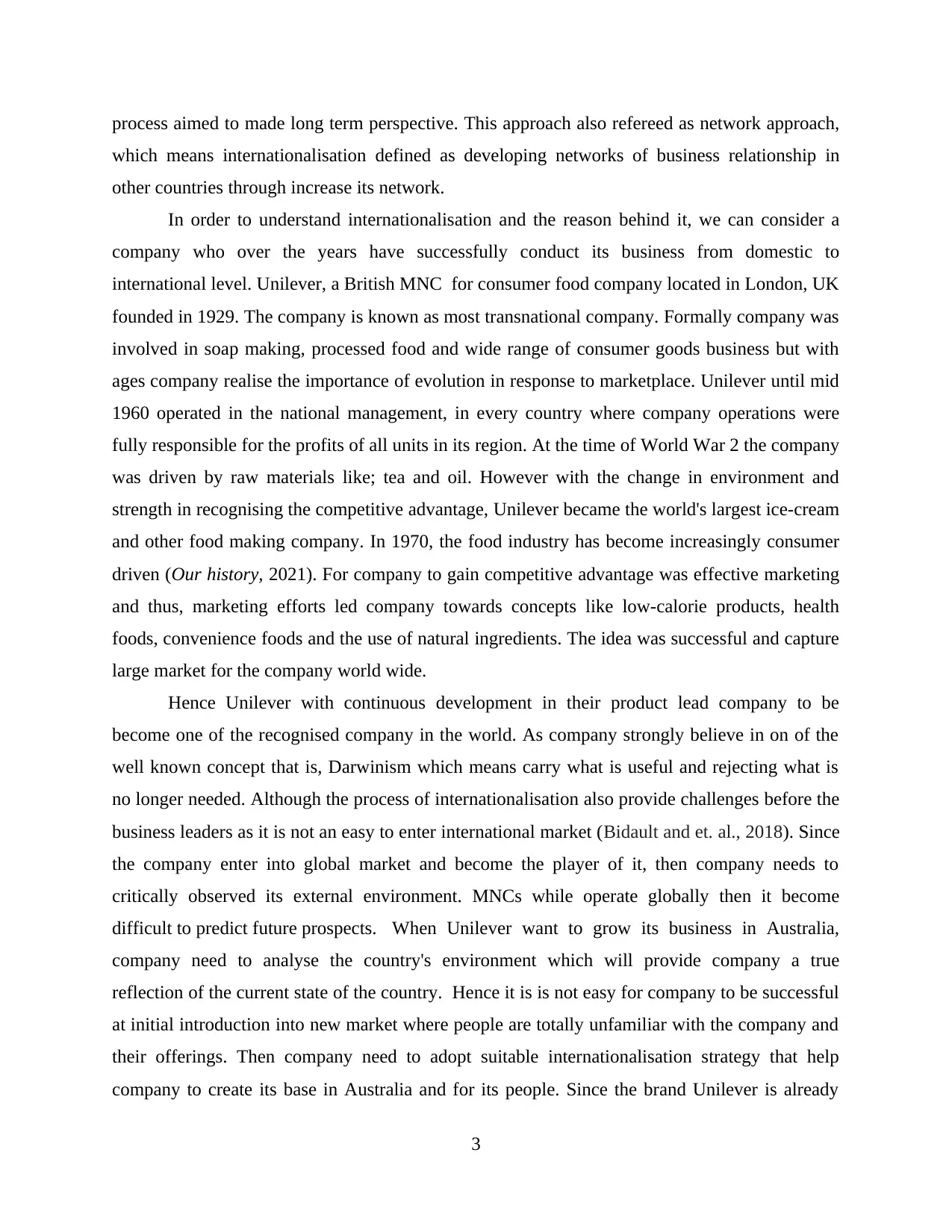
process aimed to made long term perspective. This approach also refereed as network approach,
which means internationalisation defined as developing networks of business relationship in
other countries through increase its network.
In order to understand internationalisation and the reason behind it, we can consider a
company who over the years have successfully conduct its business from domestic to
international level. Unilever, a British MNC for consumer food company located in London, UK
founded in 1929. The company is known as most transnational company. Formally company was
involved in soap making, processed food and wide range of consumer goods business but with
ages company realise the importance of evolution in response to marketplace. Unilever until mid
1960 operated in the national management, in every country where company operations were
fully responsible for the profits of all units in its region. At the time of World War 2 the company
was driven by raw materials like; tea and oil. However with the change in environment and
strength in recognising the competitive advantage, Unilever became the world's largest ice-cream
and other food making company. In 1970, the food industry has become increasingly consumer
driven (Our history, 2021). For company to gain competitive advantage was effective marketing
and thus, marketing efforts led company towards concepts like low-calorie products, health
foods, convenience foods and the use of natural ingredients. The idea was successful and capture
large market for the company world wide.
Hence Unilever with continuous development in their product lead company to be
become one of the recognised company in the world. As company strongly believe in on of the
well known concept that is, Darwinism which means carry what is useful and rejecting what is
no longer needed. Although the process of internationalisation also provide challenges before the
business leaders as it is not an easy to enter international market (Bidault and et. al., 2018). Since
the company enter into global market and become the player of it, then company needs to
critically observed its external environment. MNCs while operate globally then it become
difficult to predict future prospects. When Unilever want to grow its business in Australia,
company need to analyse the country's environment which will provide company a true
reflection of the current state of the country. Hence it is is not easy for company to be successful
at initial introduction into new market where people are totally unfamiliar with the company and
their offerings. Then company need to adopt suitable internationalisation strategy that help
company to create its base in Australia and for its people. Since the brand Unilever is already
3
which means internationalisation defined as developing networks of business relationship in
other countries through increase its network.
In order to understand internationalisation and the reason behind it, we can consider a
company who over the years have successfully conduct its business from domestic to
international level. Unilever, a British MNC for consumer food company located in London, UK
founded in 1929. The company is known as most transnational company. Formally company was
involved in soap making, processed food and wide range of consumer goods business but with
ages company realise the importance of evolution in response to marketplace. Unilever until mid
1960 operated in the national management, in every country where company operations were
fully responsible for the profits of all units in its region. At the time of World War 2 the company
was driven by raw materials like; tea and oil. However with the change in environment and
strength in recognising the competitive advantage, Unilever became the world's largest ice-cream
and other food making company. In 1970, the food industry has become increasingly consumer
driven (Our history, 2021). For company to gain competitive advantage was effective marketing
and thus, marketing efforts led company towards concepts like low-calorie products, health
foods, convenience foods and the use of natural ingredients. The idea was successful and capture
large market for the company world wide.
Hence Unilever with continuous development in their product lead company to be
become one of the recognised company in the world. As company strongly believe in on of the
well known concept that is, Darwinism which means carry what is useful and rejecting what is
no longer needed. Although the process of internationalisation also provide challenges before the
business leaders as it is not an easy to enter international market (Bidault and et. al., 2018). Since
the company enter into global market and become the player of it, then company needs to
critically observed its external environment. MNCs while operate globally then it become
difficult to predict future prospects. When Unilever want to grow its business in Australia,
company need to analyse the country's environment which will provide company a true
reflection of the current state of the country. Hence it is is not easy for company to be successful
at initial introduction into new market where people are totally unfamiliar with the company and
their offerings. Then company need to adopt suitable internationalisation strategy that help
company to create its base in Australia and for its people. Since the brand Unilever is already
3
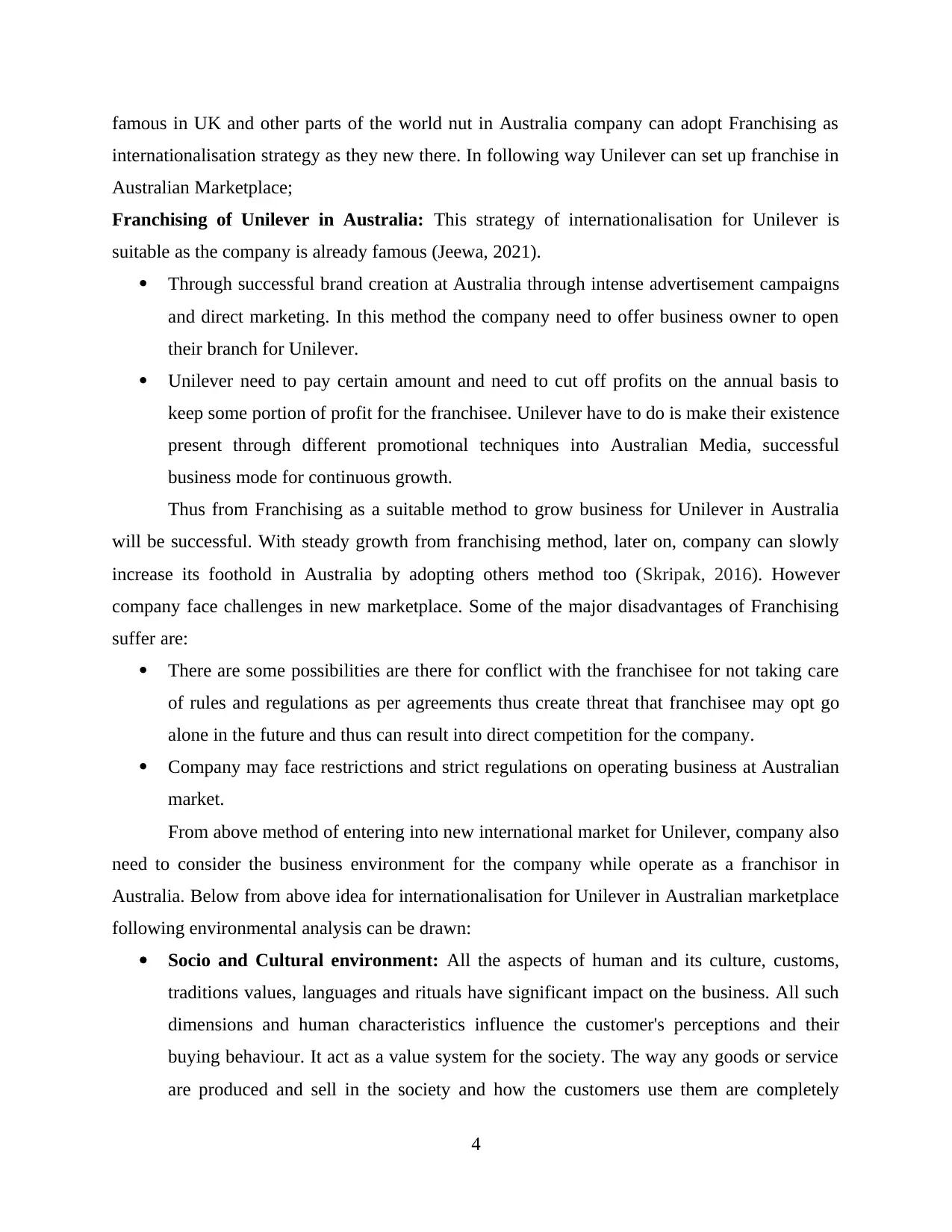
famous in UK and other parts of the world nut in Australia company can adopt Franchising as
internationalisation strategy as they new there. In following way Unilever can set up franchise in
Australian Marketplace;
Franchising of Unilever in Australia: This strategy of internationalisation for Unilever is
suitable as the company is already famous (Jeewa, 2021).
Through successful brand creation at Australia through intense advertisement campaigns
and direct marketing. In this method the company need to offer business owner to open
their branch for Unilever.
Unilever need to pay certain amount and need to cut off profits on the annual basis to
keep some portion of profit for the franchisee. Unilever have to do is make their existence
present through different promotional techniques into Australian Media, successful
business mode for continuous growth.
Thus from Franchising as a suitable method to grow business for Unilever in Australia
will be successful. With steady growth from franchising method, later on, company can slowly
increase its foothold in Australia by adopting others method too (Skripak, 2016). However
company face challenges in new marketplace. Some of the major disadvantages of Franchising
suffer are:
There are some possibilities are there for conflict with the franchisee for not taking care
of rules and regulations as per agreements thus create threat that franchisee may opt go
alone in the future and thus can result into direct competition for the company.
Company may face restrictions and strict regulations on operating business at Australian
market.
From above method of entering into new international market for Unilever, company also
need to consider the business environment for the company while operate as a franchisor in
Australia. Below from above idea for internationalisation for Unilever in Australian marketplace
following environmental analysis can be drawn:
Socio and Cultural environment: All the aspects of human and its culture, customs,
traditions values, languages and rituals have significant impact on the business. All such
dimensions and human characteristics influence the customer's perceptions and their
buying behaviour. It act as a value system for the society. The way any goods or service
are produced and sell in the society and how the customers use them are completely
4
internationalisation strategy as they new there. In following way Unilever can set up franchise in
Australian Marketplace;
Franchising of Unilever in Australia: This strategy of internationalisation for Unilever is
suitable as the company is already famous (Jeewa, 2021).
Through successful brand creation at Australia through intense advertisement campaigns
and direct marketing. In this method the company need to offer business owner to open
their branch for Unilever.
Unilever need to pay certain amount and need to cut off profits on the annual basis to
keep some portion of profit for the franchisee. Unilever have to do is make their existence
present through different promotional techniques into Australian Media, successful
business mode for continuous growth.
Thus from Franchising as a suitable method to grow business for Unilever in Australia
will be successful. With steady growth from franchising method, later on, company can slowly
increase its foothold in Australia by adopting others method too (Skripak, 2016). However
company face challenges in new marketplace. Some of the major disadvantages of Franchising
suffer are:
There are some possibilities are there for conflict with the franchisee for not taking care
of rules and regulations as per agreements thus create threat that franchisee may opt go
alone in the future and thus can result into direct competition for the company.
Company may face restrictions and strict regulations on operating business at Australian
market.
From above method of entering into new international market for Unilever, company also
need to consider the business environment for the company while operate as a franchisor in
Australia. Below from above idea for internationalisation for Unilever in Australian marketplace
following environmental analysis can be drawn:
Socio and Cultural environment: All the aspects of human and its culture, customs,
traditions values, languages and rituals have significant impact on the business. All such
dimensions and human characteristics influence the customer's perceptions and their
buying behaviour. It act as a value system for the society. The way any goods or service
are produced and sell in the society and how the customers use them are completely
4
⊘ This is a preview!⊘
Do you want full access?
Subscribe today to unlock all pages.

Trusted by 1+ million students worldwide
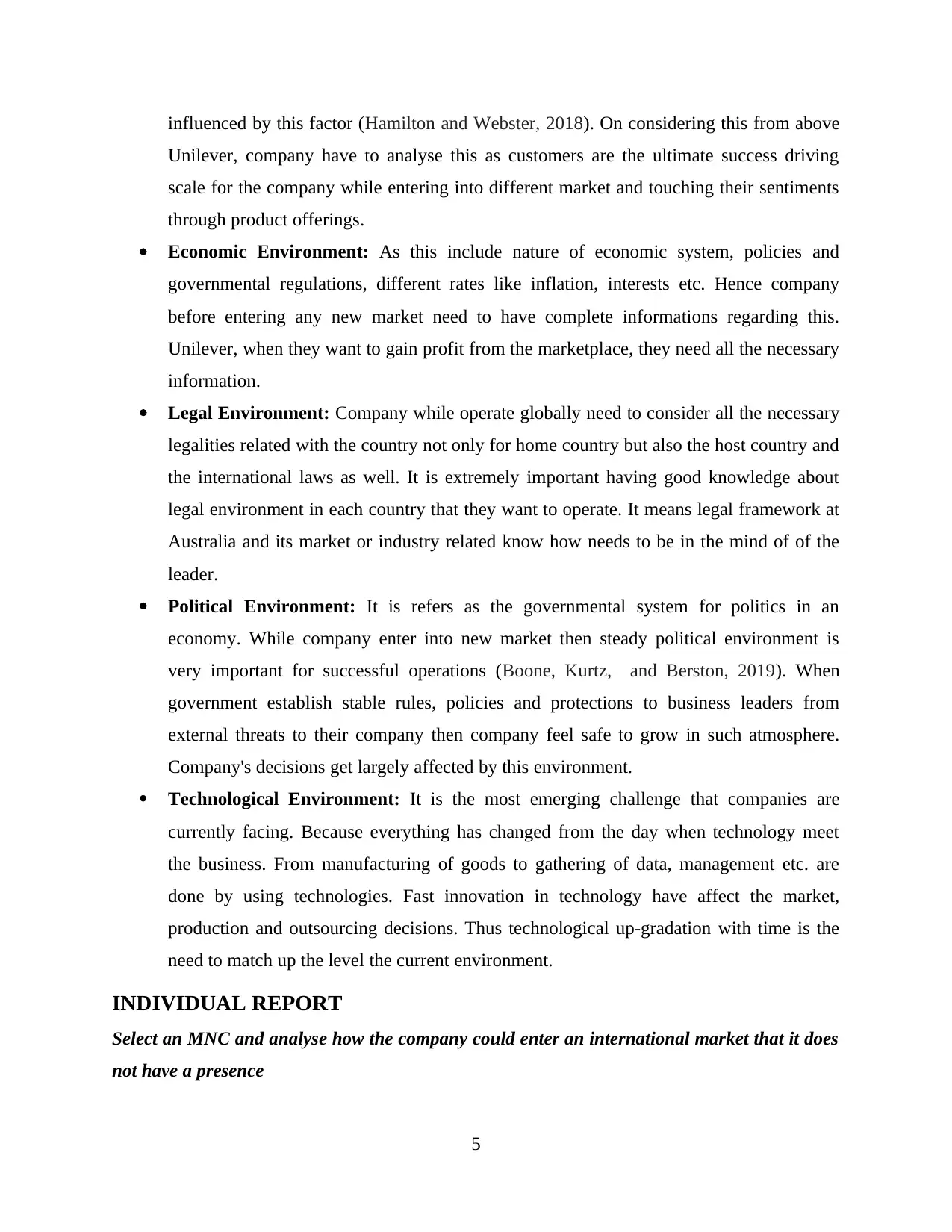
influenced by this factor (Hamilton and Webster, 2018). On considering this from above
Unilever, company have to analyse this as customers are the ultimate success driving
scale for the company while entering into different market and touching their sentiments
through product offerings.
Economic Environment: As this include nature of economic system, policies and
governmental regulations, different rates like inflation, interests etc. Hence company
before entering any new market need to have complete informations regarding this.
Unilever, when they want to gain profit from the marketplace, they need all the necessary
information.
Legal Environment: Company while operate globally need to consider all the necessary
legalities related with the country not only for home country but also the host country and
the international laws as well. It is extremely important having good knowledge about
legal environment in each country that they want to operate. It means legal framework at
Australia and its market or industry related know how needs to be in the mind of of the
leader.
Political Environment: It is refers as the governmental system for politics in an
economy. While company enter into new market then steady political environment is
very important for successful operations (Boone, Kurtz, and Berston, 2019). When
government establish stable rules, policies and protections to business leaders from
external threats to their company then company feel safe to grow in such atmosphere.
Company's decisions get largely affected by this environment.
Technological Environment: It is the most emerging challenge that companies are
currently facing. Because everything has changed from the day when technology meet
the business. From manufacturing of goods to gathering of data, management etc. are
done by using technologies. Fast innovation in technology have affect the market,
production and outsourcing decisions. Thus technological up-gradation with time is the
need to match up the level the current environment.
INDIVIDUAL REPORT
Select an MNC and analyse how the company could enter an international market that it does
not have a presence
5
Unilever, company have to analyse this as customers are the ultimate success driving
scale for the company while entering into different market and touching their sentiments
through product offerings.
Economic Environment: As this include nature of economic system, policies and
governmental regulations, different rates like inflation, interests etc. Hence company
before entering any new market need to have complete informations regarding this.
Unilever, when they want to gain profit from the marketplace, they need all the necessary
information.
Legal Environment: Company while operate globally need to consider all the necessary
legalities related with the country not only for home country but also the host country and
the international laws as well. It is extremely important having good knowledge about
legal environment in each country that they want to operate. It means legal framework at
Australia and its market or industry related know how needs to be in the mind of of the
leader.
Political Environment: It is refers as the governmental system for politics in an
economy. While company enter into new market then steady political environment is
very important for successful operations (Boone, Kurtz, and Berston, 2019). When
government establish stable rules, policies and protections to business leaders from
external threats to their company then company feel safe to grow in such atmosphere.
Company's decisions get largely affected by this environment.
Technological Environment: It is the most emerging challenge that companies are
currently facing. Because everything has changed from the day when technology meet
the business. From manufacturing of goods to gathering of data, management etc. are
done by using technologies. Fast innovation in technology have affect the market,
production and outsourcing decisions. Thus technological up-gradation with time is the
need to match up the level the current environment.
INDIVIDUAL REPORT
Select an MNC and analyse how the company could enter an international market that it does
not have a presence
5
Paraphrase This Document
Need a fresh take? Get an instant paraphrase of this document with our AI Paraphraser
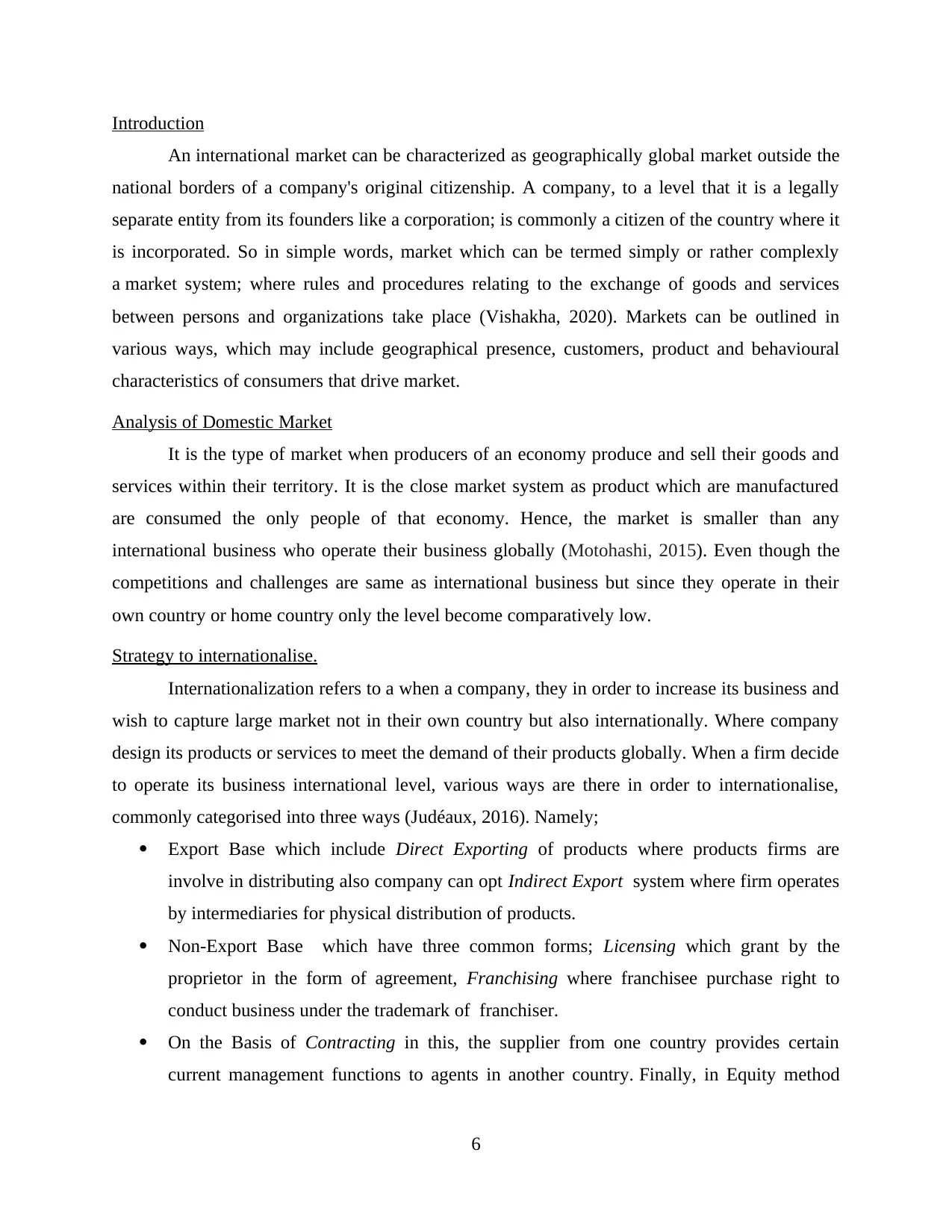
Introduction
An international market can be characterized as geographically global market outside the
national borders of a company's original citizenship. A company, to a level that it is a legally
separate entity from its founders like a corporation; is commonly a citizen of the country where it
is incorporated. So in simple words, market which can be termed simply or rather complexly
a market system; where rules and procedures relating to the exchange of goods and services
between persons and organizations take place (Vishakha, 2020). Markets can be outlined in
various ways, which may include geographical presence, customers, product and behavioural
characteristics of consumers that drive market.
Analysis of Domestic Market
It is the type of market when producers of an economy produce and sell their goods and
services within their territory. It is the close market system as product which are manufactured
are consumed the only people of that economy. Hence, the market is smaller than any
international business who operate their business globally (Motohashi, 2015). Even though the
competitions and challenges are same as international business but since they operate in their
own country or home country only the level become comparatively low.
Strategy to internationalise.
Internationalization refers to a when a company, they in order to increase its business and
wish to capture large market not in their own country but also internationally. Where company
design its products or services to meet the demand of their products globally. When a firm decide
to operate its business international level, various ways are there in order to internationalise,
commonly categorised into three ways (Judéaux, 2016). Namely;
Export Base which include Direct Exporting of products where products firms are
involve in distributing also company can opt Indirect Export system where firm operates
by intermediaries for physical distribution of products.
Non-Export Base which have three common forms; Licensing which grant by the
proprietor in the form of agreement, Franchising where franchisee purchase right to
conduct business under the trademark of franchiser.
On the Basis of Contracting in this, the supplier from one country provides certain
current management functions to agents in another country. Finally, in Equity method
6
An international market can be characterized as geographically global market outside the
national borders of a company's original citizenship. A company, to a level that it is a legally
separate entity from its founders like a corporation; is commonly a citizen of the country where it
is incorporated. So in simple words, market which can be termed simply or rather complexly
a market system; where rules and procedures relating to the exchange of goods and services
between persons and organizations take place (Vishakha, 2020). Markets can be outlined in
various ways, which may include geographical presence, customers, product and behavioural
characteristics of consumers that drive market.
Analysis of Domestic Market
It is the type of market when producers of an economy produce and sell their goods and
services within their territory. It is the close market system as product which are manufactured
are consumed the only people of that economy. Hence, the market is smaller than any
international business who operate their business globally (Motohashi, 2015). Even though the
competitions and challenges are same as international business but since they operate in their
own country or home country only the level become comparatively low.
Strategy to internationalise.
Internationalization refers to a when a company, they in order to increase its business and
wish to capture large market not in their own country but also internationally. Where company
design its products or services to meet the demand of their products globally. When a firm decide
to operate its business international level, various ways are there in order to internationalise,
commonly categorised into three ways (Judéaux, 2016). Namely;
Export Base which include Direct Exporting of products where products firms are
involve in distributing also company can opt Indirect Export system where firm operates
by intermediaries for physical distribution of products.
Non-Export Base which have three common forms; Licensing which grant by the
proprietor in the form of agreement, Franchising where franchisee purchase right to
conduct business under the trademark of franchiser.
On the Basis of Contracting in this, the supplier from one country provides certain
current management functions to agents in another country. Finally, in Equity method
6
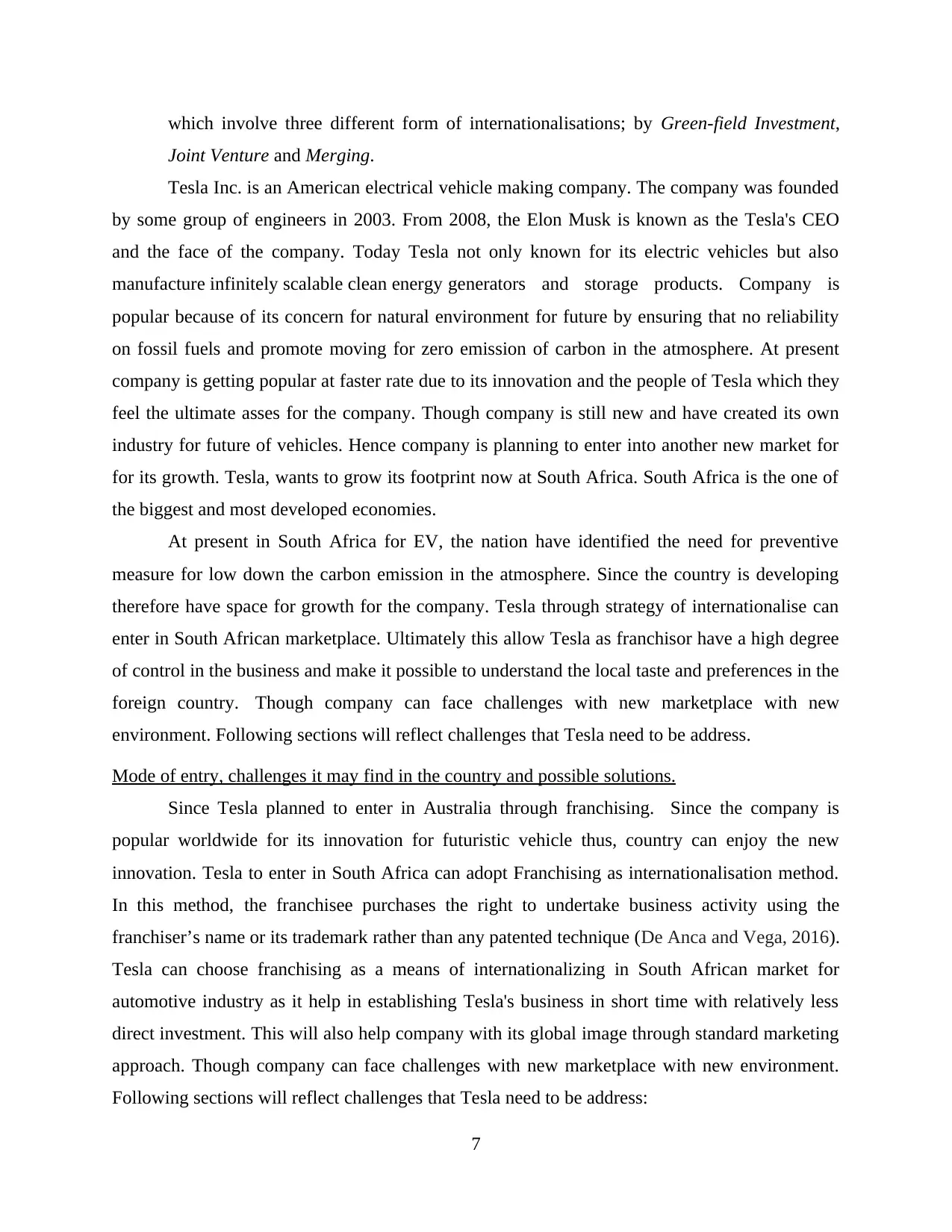
which involve three different form of internationalisations; by Green-field Investment,
Joint Venture and Merging.
Tesla Inc. is an American electrical vehicle making company. The company was founded
by some group of engineers in 2003. From 2008, the Elon Musk is known as the Tesla's CEO
and the face of the company. Today Tesla not only known for its electric vehicles but also
manufacture infinitely scalable clean energy generators and storage products. Company is
popular because of its concern for natural environment for future by ensuring that no reliability
on fossil fuels and promote moving for zero emission of carbon in the atmosphere. At present
company is getting popular at faster rate due to its innovation and the people of Tesla which they
feel the ultimate asses for the company. Though company is still new and have created its own
industry for future of vehicles. Hence company is planning to enter into another new market for
for its growth. Tesla, wants to grow its footprint now at South Africa. South Africa is the one of
the biggest and most developed economies.
At present in South Africa for EV, the nation have identified the need for preventive
measure for low down the carbon emission in the atmosphere. Since the country is developing
therefore have space for growth for the company. Tesla through strategy of internationalise can
enter in South African marketplace. Ultimately this allow Tesla as franchisor have a high degree
of control in the business and make it possible to understand the local taste and preferences in the
foreign country. Though company can face challenges with new marketplace with new
environment. Following sections will reflect challenges that Tesla need to be address.
Mode of entry, challenges it may find in the country and possible solutions.
Since Tesla planned to enter in Australia through franchising. Since the company is
popular worldwide for its innovation for futuristic vehicle thus, country can enjoy the new
innovation. Tesla to enter in South Africa can adopt Franchising as internationalisation method.
In this method, the franchisee purchases the right to undertake business activity using the
franchiser’s name or its trademark rather than any patented technique (De Anca and Vega, 2016).
Tesla can choose franchising as a means of internationalizing in South African market for
automotive industry as it help in establishing Tesla's business in short time with relatively less
direct investment. This will also help company with its global image through standard marketing
approach. Though company can face challenges with new marketplace with new environment.
Following sections will reflect challenges that Tesla need to be address:
7
Joint Venture and Merging.
Tesla Inc. is an American electrical vehicle making company. The company was founded
by some group of engineers in 2003. From 2008, the Elon Musk is known as the Tesla's CEO
and the face of the company. Today Tesla not only known for its electric vehicles but also
manufacture infinitely scalable clean energy generators and storage products. Company is
popular because of its concern for natural environment for future by ensuring that no reliability
on fossil fuels and promote moving for zero emission of carbon in the atmosphere. At present
company is getting popular at faster rate due to its innovation and the people of Tesla which they
feel the ultimate asses for the company. Though company is still new and have created its own
industry for future of vehicles. Hence company is planning to enter into another new market for
for its growth. Tesla, wants to grow its footprint now at South Africa. South Africa is the one of
the biggest and most developed economies.
At present in South Africa for EV, the nation have identified the need for preventive
measure for low down the carbon emission in the atmosphere. Since the country is developing
therefore have space for growth for the company. Tesla through strategy of internationalise can
enter in South African marketplace. Ultimately this allow Tesla as franchisor have a high degree
of control in the business and make it possible to understand the local taste and preferences in the
foreign country. Though company can face challenges with new marketplace with new
environment. Following sections will reflect challenges that Tesla need to be address.
Mode of entry, challenges it may find in the country and possible solutions.
Since Tesla planned to enter in Australia through franchising. Since the company is
popular worldwide for its innovation for futuristic vehicle thus, country can enjoy the new
innovation. Tesla to enter in South Africa can adopt Franchising as internationalisation method.
In this method, the franchisee purchases the right to undertake business activity using the
franchiser’s name or its trademark rather than any patented technique (De Anca and Vega, 2016).
Tesla can choose franchising as a means of internationalizing in South African market for
automotive industry as it help in establishing Tesla's business in short time with relatively less
direct investment. This will also help company with its global image through standard marketing
approach. Though company can face challenges with new marketplace with new environment.
Following sections will reflect challenges that Tesla need to be address:
7
⊘ This is a preview!⊘
Do you want full access?
Subscribe today to unlock all pages.

Trusted by 1+ million students worldwide
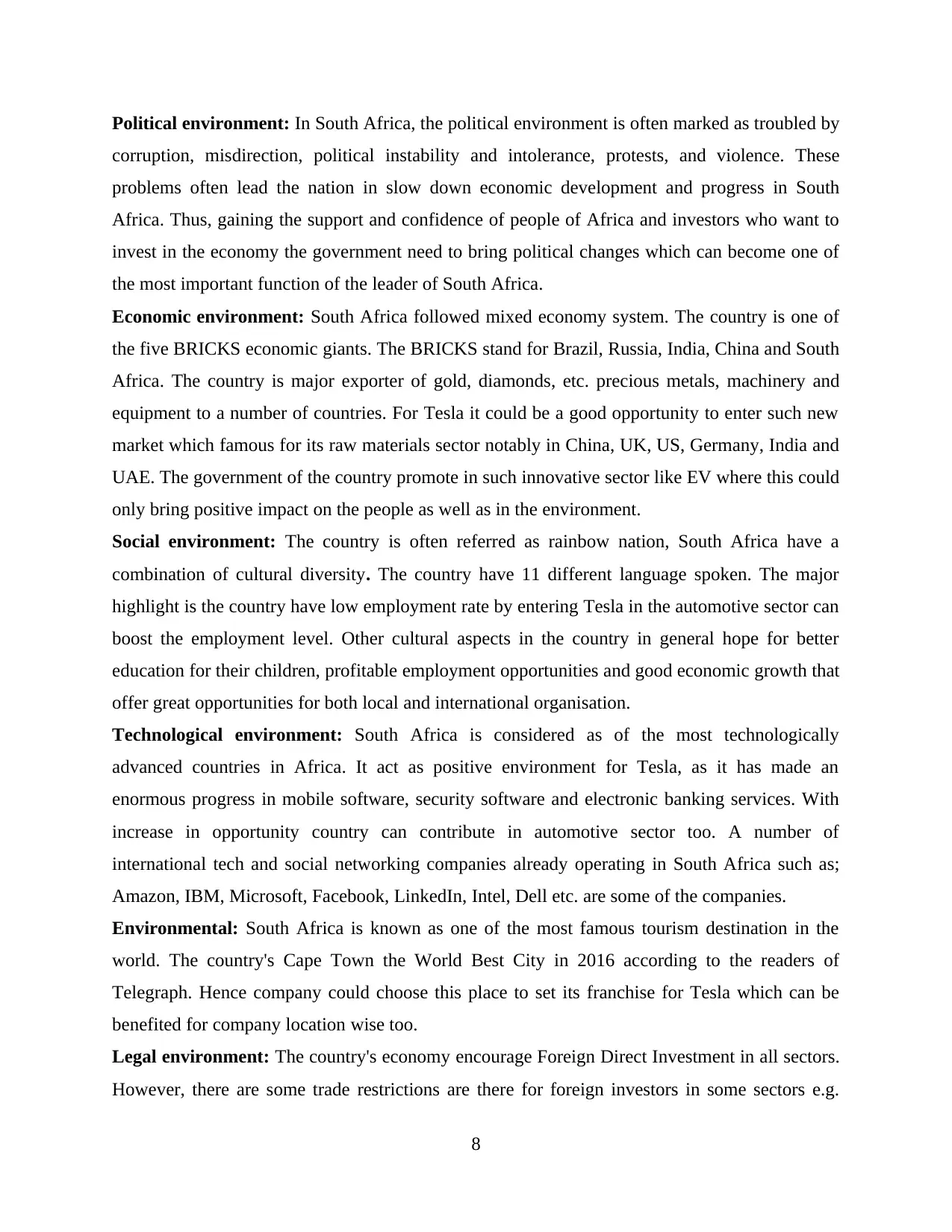
Political environment: In South Africa, the political environment is often marked as troubled by
corruption, misdirection, political instability and intolerance, protests, and violence. These
problems often lead the nation in slow down economic development and progress in South
Africa. Thus, gaining the support and confidence of people of Africa and investors who want to
invest in the economy the government need to bring political changes which can become one of
the most important function of the leader of South Africa.
Economic environment: South Africa followed mixed economy system. The country is one of
the five BRICKS economic giants. The BRICKS stand for Brazil, Russia, India, China and South
Africa. The country is major exporter of gold, diamonds, etc. precious metals, machinery and
equipment to a number of countries. For Tesla it could be a good opportunity to enter such new
market which famous for its raw materials sector notably in China, UK, US, Germany, India and
UAE. The government of the country promote in such innovative sector like EV where this could
only bring positive impact on the people as well as in the environment.
Social environment: The country is often referred as rainbow nation, South Africa have a
combination of cultural diversity. The country have 11 different language spoken. The major
highlight is the country have low employment rate by entering Tesla in the automotive sector can
boost the employment level. Other cultural aspects in the country in general hope for better
education for their children, profitable employment opportunities and good economic growth that
offer great opportunities for both local and international organisation.
Technological environment: South Africa is considered as of the most technologically
advanced countries in Africa. It act as positive environment for Tesla, as it has made an
enormous progress in mobile software, security software and electronic banking services. With
increase in opportunity country can contribute in automotive sector too. A number of
international tech and social networking companies already operating in South Africa such as;
Amazon, IBM, Microsoft, Facebook, LinkedIn, Intel, Dell etc. are some of the companies.
Environmental: South Africa is known as one of the most famous tourism destination in the
world. The country's Cape Town the World Best City in 2016 according to the readers of
Telegraph. Hence company could choose this place to set its franchise for Tesla which can be
benefited for company location wise too.
Legal environment: The country's economy encourage Foreign Direct Investment in all sectors.
However, there are some trade restrictions are there for foreign investors in some sectors e.g.
8
corruption, misdirection, political instability and intolerance, protests, and violence. These
problems often lead the nation in slow down economic development and progress in South
Africa. Thus, gaining the support and confidence of people of Africa and investors who want to
invest in the economy the government need to bring political changes which can become one of
the most important function of the leader of South Africa.
Economic environment: South Africa followed mixed economy system. The country is one of
the five BRICKS economic giants. The BRICKS stand for Brazil, Russia, India, China and South
Africa. The country is major exporter of gold, diamonds, etc. precious metals, machinery and
equipment to a number of countries. For Tesla it could be a good opportunity to enter such new
market which famous for its raw materials sector notably in China, UK, US, Germany, India and
UAE. The government of the country promote in such innovative sector like EV where this could
only bring positive impact on the people as well as in the environment.
Social environment: The country is often referred as rainbow nation, South Africa have a
combination of cultural diversity. The country have 11 different language spoken. The major
highlight is the country have low employment rate by entering Tesla in the automotive sector can
boost the employment level. Other cultural aspects in the country in general hope for better
education for their children, profitable employment opportunities and good economic growth that
offer great opportunities for both local and international organisation.
Technological environment: South Africa is considered as of the most technologically
advanced countries in Africa. It act as positive environment for Tesla, as it has made an
enormous progress in mobile software, security software and electronic banking services. With
increase in opportunity country can contribute in automotive sector too. A number of
international tech and social networking companies already operating in South Africa such as;
Amazon, IBM, Microsoft, Facebook, LinkedIn, Intel, Dell etc. are some of the companies.
Environmental: South Africa is known as one of the most famous tourism destination in the
world. The country's Cape Town the World Best City in 2016 according to the readers of
Telegraph. Hence company could choose this place to set its franchise for Tesla which can be
benefited for company location wise too.
Legal environment: The country's economy encourage Foreign Direct Investment in all sectors.
However, there are some trade restrictions are there for foreign investors in some sectors e.g.
8
Paraphrase This Document
Need a fresh take? Get an instant paraphrase of this document with our AI Paraphraser
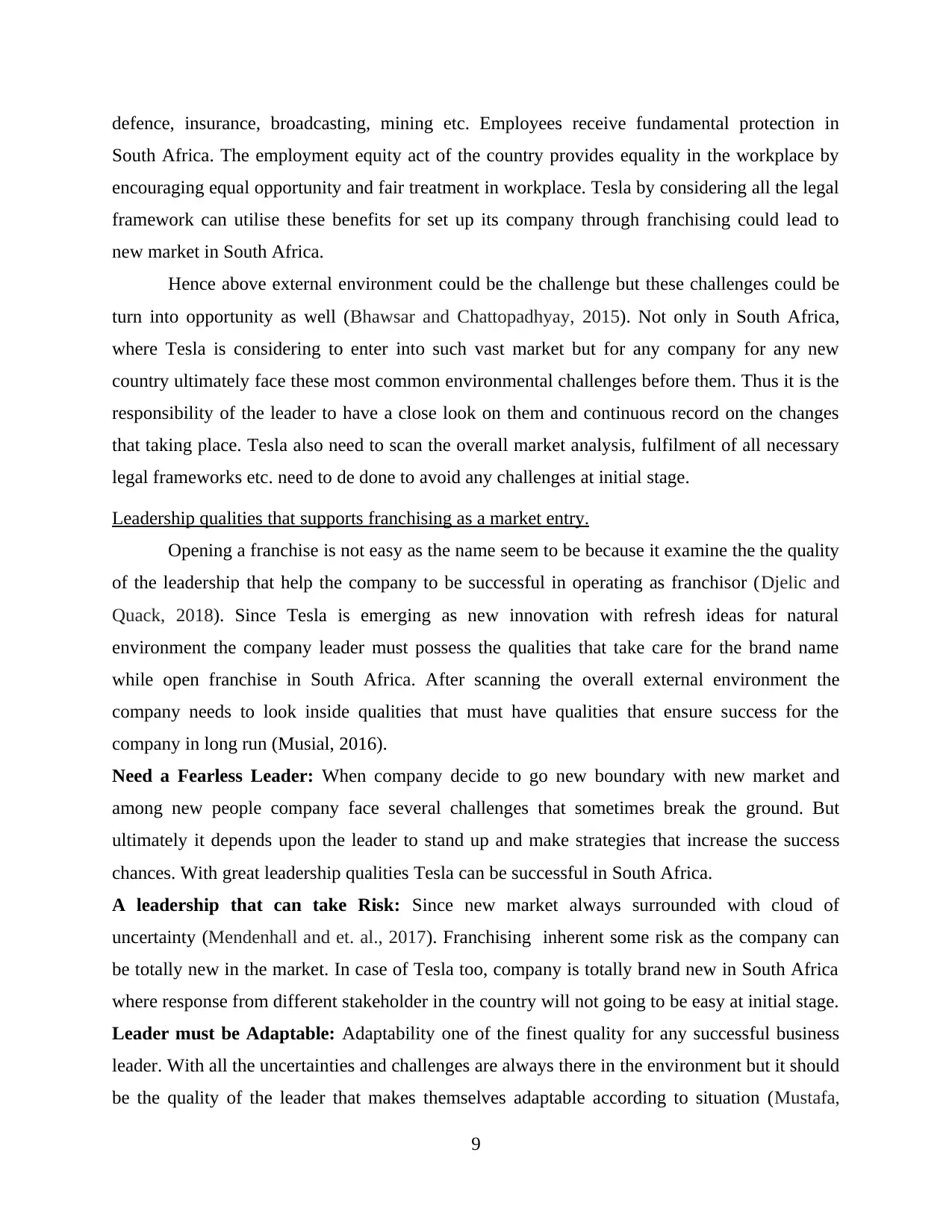
defence, insurance, broadcasting, mining etc. Employees receive fundamental protection in
South Africa. The employment equity act of the country provides equality in the workplace by
encouraging equal opportunity and fair treatment in workplace. Tesla by considering all the legal
framework can utilise these benefits for set up its company through franchising could lead to
new market in South Africa.
Hence above external environment could be the challenge but these challenges could be
turn into opportunity as well (Bhawsar and Chattopadhyay, 2015). Not only in South Africa,
where Tesla is considering to enter into such vast market but for any company for any new
country ultimately face these most common environmental challenges before them. Thus it is the
responsibility of the leader to have a close look on them and continuous record on the changes
that taking place. Tesla also need to scan the overall market analysis, fulfilment of all necessary
legal frameworks etc. need to de done to avoid any challenges at initial stage.
Leadership qualities that supports franchising as a market entry.
Opening a franchise is not easy as the name seem to be because it examine the the quality
of the leadership that help the company to be successful in operating as franchisor (Djelic and
Quack, 2018). Since Tesla is emerging as new innovation with refresh ideas for natural
environment the company leader must possess the qualities that take care for the brand name
while open franchise in South Africa. After scanning the overall external environment the
company needs to look inside qualities that must have qualities that ensure success for the
company in long run (Musial, 2016).
Need a Fearless Leader: When company decide to go new boundary with new market and
among new people company face several challenges that sometimes break the ground. But
ultimately it depends upon the leader to stand up and make strategies that increase the success
chances. With great leadership qualities Tesla can be successful in South Africa.
A leadership that can take Risk: Since new market always surrounded with cloud of
uncertainty (Mendenhall and et. al., 2017). Franchising inherent some risk as the company can
be totally new in the market. In case of Tesla too, company is totally brand new in South Africa
where response from different stakeholder in the country will not going to be easy at initial stage.
Leader must be Adaptable: Adaptability one of the finest quality for any successful business
leader. With all the uncertainties and challenges are always there in the environment but it should
be the quality of the leader that makes themselves adaptable according to situation (Mustafa,
9
South Africa. The employment equity act of the country provides equality in the workplace by
encouraging equal opportunity and fair treatment in workplace. Tesla by considering all the legal
framework can utilise these benefits for set up its company through franchising could lead to
new market in South Africa.
Hence above external environment could be the challenge but these challenges could be
turn into opportunity as well (Bhawsar and Chattopadhyay, 2015). Not only in South Africa,
where Tesla is considering to enter into such vast market but for any company for any new
country ultimately face these most common environmental challenges before them. Thus it is the
responsibility of the leader to have a close look on them and continuous record on the changes
that taking place. Tesla also need to scan the overall market analysis, fulfilment of all necessary
legal frameworks etc. need to de done to avoid any challenges at initial stage.
Leadership qualities that supports franchising as a market entry.
Opening a franchise is not easy as the name seem to be because it examine the the quality
of the leadership that help the company to be successful in operating as franchisor (Djelic and
Quack, 2018). Since Tesla is emerging as new innovation with refresh ideas for natural
environment the company leader must possess the qualities that take care for the brand name
while open franchise in South Africa. After scanning the overall external environment the
company needs to look inside qualities that must have qualities that ensure success for the
company in long run (Musial, 2016).
Need a Fearless Leader: When company decide to go new boundary with new market and
among new people company face several challenges that sometimes break the ground. But
ultimately it depends upon the leader to stand up and make strategies that increase the success
chances. With great leadership qualities Tesla can be successful in South Africa.
A leadership that can take Risk: Since new market always surrounded with cloud of
uncertainty (Mendenhall and et. al., 2017). Franchising inherent some risk as the company can
be totally new in the market. In case of Tesla too, company is totally brand new in South Africa
where response from different stakeholder in the country will not going to be easy at initial stage.
Leader must be Adaptable: Adaptability one of the finest quality for any successful business
leader. With all the uncertainties and challenges are always there in the environment but it should
be the quality of the leader that makes themselves adaptable according to situation (Mustafa,
9
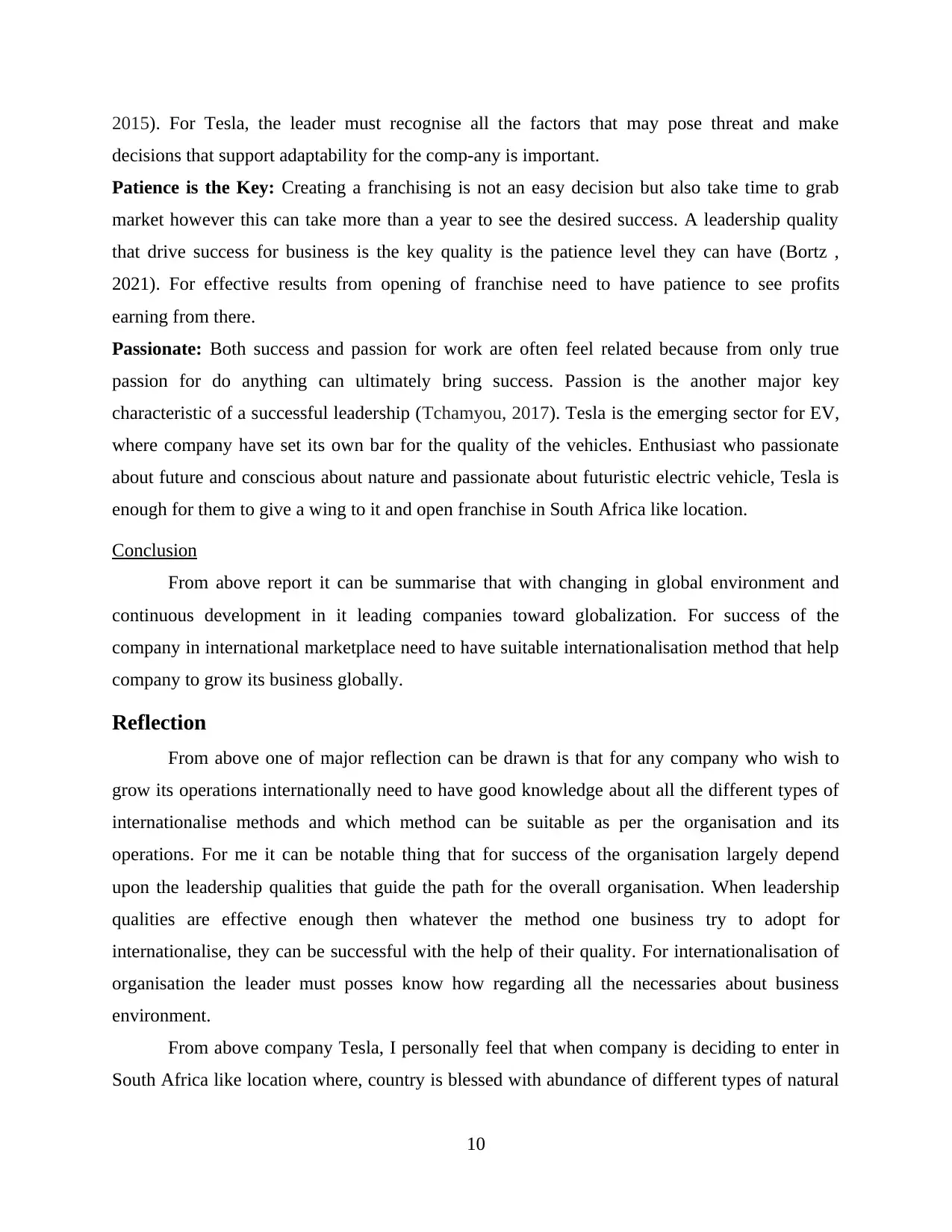
2015). For Tesla, the leader must recognise all the factors that may pose threat and make
decisions that support adaptability for the comp-any is important.
Patience is the Key: Creating a franchising is not an easy decision but also take time to grab
market however this can take more than a year to see the desired success. A leadership quality
that drive success for business is the key quality is the patience level they can have (Bortz ,
2021). For effective results from opening of franchise need to have patience to see profits
earning from there.
Passionate: Both success and passion for work are often feel related because from only true
passion for do anything can ultimately bring success. Passion is the another major key
characteristic of a successful leadership (Tchamyou, 2017). Tesla is the emerging sector for EV,
where company have set its own bar for the quality of the vehicles. Enthusiast who passionate
about future and conscious about nature and passionate about futuristic electric vehicle, Tesla is
enough for them to give a wing to it and open franchise in South Africa like location.
Conclusion
From above report it can be summarise that with changing in global environment and
continuous development in it leading companies toward globalization. For success of the
company in international marketplace need to have suitable internationalisation method that help
company to grow its business globally.
Reflection
From above one of major reflection can be drawn is that for any company who wish to
grow its operations internationally need to have good knowledge about all the different types of
internationalise methods and which method can be suitable as per the organisation and its
operations. For me it can be notable thing that for success of the organisation largely depend
upon the leadership qualities that guide the path for the overall organisation. When leadership
qualities are effective enough then whatever the method one business try to adopt for
internationalise, they can be successful with the help of their quality. For internationalisation of
organisation the leader must posses know how regarding all the necessaries about business
environment.
From above company Tesla, I personally feel that when company is deciding to enter in
South Africa like location where, country is blessed with abundance of different types of natural
10
decisions that support adaptability for the comp-any is important.
Patience is the Key: Creating a franchising is not an easy decision but also take time to grab
market however this can take more than a year to see the desired success. A leadership quality
that drive success for business is the key quality is the patience level they can have (Bortz ,
2021). For effective results from opening of franchise need to have patience to see profits
earning from there.
Passionate: Both success and passion for work are often feel related because from only true
passion for do anything can ultimately bring success. Passion is the another major key
characteristic of a successful leadership (Tchamyou, 2017). Tesla is the emerging sector for EV,
where company have set its own bar for the quality of the vehicles. Enthusiast who passionate
about future and conscious about nature and passionate about futuristic electric vehicle, Tesla is
enough for them to give a wing to it and open franchise in South Africa like location.
Conclusion
From above report it can be summarise that with changing in global environment and
continuous development in it leading companies toward globalization. For success of the
company in international marketplace need to have suitable internationalisation method that help
company to grow its business globally.
Reflection
From above one of major reflection can be drawn is that for any company who wish to
grow its operations internationally need to have good knowledge about all the different types of
internationalise methods and which method can be suitable as per the organisation and its
operations. For me it can be notable thing that for success of the organisation largely depend
upon the leadership qualities that guide the path for the overall organisation. When leadership
qualities are effective enough then whatever the method one business try to adopt for
internationalise, they can be successful with the help of their quality. For internationalisation of
organisation the leader must posses know how regarding all the necessaries about business
environment.
From above company Tesla, I personally feel that when company is deciding to enter in
South Africa like location where, country is blessed with abundance of different types of natural
10
⊘ This is a preview!⊘
Do you want full access?
Subscribe today to unlock all pages.

Trusted by 1+ million students worldwide
1 out of 16
Related Documents
Your All-in-One AI-Powered Toolkit for Academic Success.
+13062052269
info@desklib.com
Available 24*7 on WhatsApp / Email
![[object Object]](/_next/static/media/star-bottom.7253800d.svg)
Unlock your academic potential
Copyright © 2020–2026 A2Z Services. All Rights Reserved. Developed and managed by ZUCOL.





